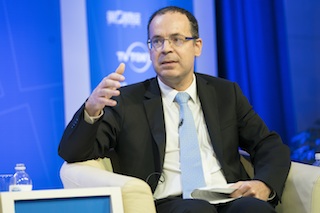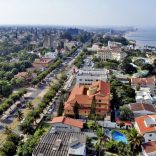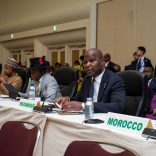Mozambique: Over 14% of state external debt held by China in March - report
Watch – Mozambique’s public debt crisis: A taboo at IMF/World Bank Annual Meetings 2017

The Proindicus, Ematum and MAM debt crisis was a taboo topic at the annual IMF and World Bank meeting in Washington, DC., with senior officials from the Bretton Woods institutions, academics and heads of global financial institutions declining to answer @Verdade’s questions on the subject.
In the wake of the recovery of the world economy, Mozambique’s gross domestic product is expected to grow by 5.3% in 2018, the IMF’s World Economic Outlook report released on Tuesday 10 October predicts. However, this growth projection is lower than last April’s IMF forecast in which analysts anticipated economic expansion of 5.5%.

This year, the Fund revised its forecast to 4.7%, mainly due to the increase in the price of mineral coal.
However, when asked by @Verdade (pictured, left) whether these projections for 2018 took into account the resumption of financial co-operation with the IMF, Maurice Obstfeld, Economic Counsellor and Director of Research at the International Monetary Fund, directed questions to his associates at the African Affairs Department, who were expected to speak with @Verdade on Friday 13 October [see video below].
Meanwhile, on Wednesday 11 October, during a debate on ‘Sovereign Debt in Developing Countries: Rising Vulnerabilities and the Path to Resilience’ moderated by Oxford professor Sir Paul Collier, @Verdade asked the panel to comment on how Mozambique could solve its sovereign debt crisis.

Guillaume Chabert (pictured, right), a leading Paris Club official and one of the five panellists, said that it was best not to respond to @Verdade’s questions. On the sidelines of the debate, Chabert, who is aware of the Mozambican situation, also declined to comment on how the country could resolve its impasse with the IMF.
Informally, Minister Adriano Maleiane, who heads the Mozambican delegation, told @Verdade that he hoped to return to Maputo this week (13 to 20 October) with the issue of the IMF programme resolved.
However, the IMF will not even consider a new programme with Mozambique until the country reveals (in a transparent manner) how the more than US$2 billion in loans was used between 2013 and 2014 and initiates measures to hold those who violated the Constitution and budgetary laws to account.
IMF# Press Briefing: African Department #Moçambique pic.twitter.com/47V6FLClPV
— Nuno Teixeira (@teveen) October 15, 2017
Also Read: “We are waiting”- IMF’s Selassie on Mozambique’s debt audit gaps
Urged to comment on the World Economic Outlook projections, Mozambican economist António Francisco explained that “regardless of the numerical detail, what seems clear is that, as the projected date nears, the IMF recognises that the previous assumptions of recovery of the Mozambican economy need to be adjusted to a less promising reality than the one anticipated”.
“In this particular case, it means that the IMF is beginning to believe that the year 2018 may not be much better than this year. This is made clear by the fact that many of the expectations of resumption of the relationship between the partners and the government … have been contradicted by a disappointing response from the Mozambican state,” he added.
This assessment does not surprise Francisco, who says: “On the one hand, the government has been reluctant, or incapable, of dealing proactively and better with the litigation of hidden debts. On the other hand, it does not have a proactive vision on the economic reforms that the Mozambican economy needs. If any hope could have existed as to the possibility of the Frelimo Congress leading to a more progressive strategic vision for state action and its relationship with economic agents, it is now clear that the result is very disappointing”.
Recalling that, in an interview with @Verdade about a year ago, he had predicted that there was no reason to believe that the crisis was outdated, Francisco said that: “We are swimming in the same swamp, with no capacity to change things; we are left inly with the hope that the swamp will dry by itself.”
“Considering the recent competitiveness and business environment indicators, in which Mozambique recently regressed by more than for many years, what stimulus can investors implement to create new jobs? Quite frankly, I do not see any,” the Institute for Social and Economic Studies (IESE) researcher concluded.
Although inflation is slowing, economic activity is declining; new jobs will not arise, and more redundancies are likely. All there is to do is to wait patiently for the Attorney-General’s Office to clarify the gaps surrounding the debts and enforce the accountability of those who initiated them. The ruler Frelimo members meanwhile will continue to lead the noble life of stewardship, while Mozambicans generally pay the price.
By Adérito Caldeira












Leave a Reply
Be the First to Comment!
You must be logged in to post a comment.
You must be logged in to post a comment.